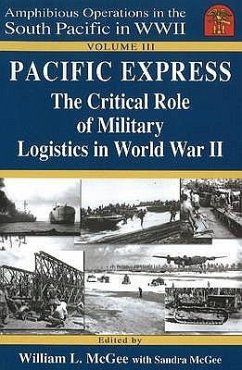Under one cover, an edited collection of the best works by noted military historians on the importance of military logistics in World War II. *** PACIFIC EXPRESS was selected to be on the Marine Corps Commandant's Professional Reading List for Logistics and is required annual reading on military logistics for all officer and enlisted Marines whether active duty or reserve. *** In PACIFIC EXPRESS, award-winning World War II military historian William L. McGee acts as editor and gathers together a collection of writings on military logistics in WWII. IN THE AUTHOR'S WORDS: "I felt compelled to honor all the men and women - military and civilian - who served during World War II in logistical support roles for the front line combatants: ship builders, advance bases and floating service squadrons, Naval Transportation Service, Navy Seabees, Marine Corps Engineers, Merchant Marine, Naval Armed Guard, Army Transportation Corps, and Coast Guard. I believed these non-combatant service personnel were (and are) often overshadowed by those who served in combat." - William L. McGee Consider this: Victory may be won or lost in battle, but all military history shows that adequate logistics support is essential to the winning of the battle. During World War II, 16.1 million men and women served in the U.S. Armed Forces. However, for every individual combatant, there were ten supportive personnel both overseas and on the home front. (Source: Washington, D.C.: National Archives and Record Administrator) McGee profiles many of the major components of the "Pacific express" * U.S. Navy Seabees and U.S. Marine Corps Engineers who built the Advance Bases. * U.S. Navy crews who manned the amphibious force and Fleets floating mobile Service Squadrons throughout the vast reaches of the Pacific. * U.S. Merchant Marine and U.S. Naval Armed Guard who manned and defended the thousands of WSA cargo ships, transports, and tankers to "deliver the goods." * U.S. Coast Guardsmen who manned hundreds of U.S. Army and Navy long-haul vessels and thousands of battle-loaded amphibious landing ships and craft. 560 pp, 111 b/w photos, 7 maps, 21 figures/tables/charts, appendix, notes, bibliography, index. OTHER VOLUMES IN THE SERIES Vol. I, The Amphibians Are Coming! Emergence of the 'Gator Navy and its Revolutionary Landing Craft Vol. II, The Solomons Campaigns, 1942-1943: From Guadalcanal to Bougainville, Pacific War Turning Point








